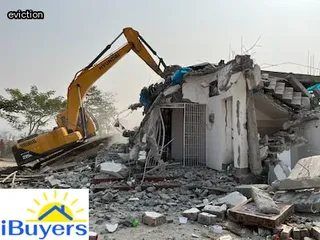When it comes to determining when a tenant has abandoned your rental property, there are some factors to consider. First and foremost, you should look for an extended period of time where the tenant is not paying rent and has not contacted you about their situation.
Additionally, if the tenant has removed all of their belongings from the rental property, this can be taken as a sign that they have abandoned the premises. The tenant may also provide you with written notice that they are vacating the property; however, this does not always mean that abandonment has occurred.
It is important to ensure that all legal documents between you and your tenant have been properly signed in order to confirm that the tenant has officially abandoned the rental. While it can be difficult at times to determine whether or not a tenant has abandoned your rental property, following these steps will help you reach a definitive conclusion.

When a tenant abandons a rental property, it can be a difficult situation for landlords. Fortunately, there are strategies that can help landlords handle the issue in an efficient manner.
First, it is important to take steps to verify that the tenant has indeed abandoned the property and is no longer living there. This may involve contacting other tenants in the building or checking utility usage.
Next, landlords should check their state’s laws regarding abandoned property and any security deposits associated with it. Additionally, landlords will need to take steps to secure the property and mitigate any damages due to abandonment.
Finally, landlords should also consider pursuing legal action against the tenant if necessary in order to recover any unpaid rent or damage costs. By taking all of these steps, landlords can ensure that handling an abandoned rental property does not become too costly or time consuming of an endeavor.
When a tenant abruptly leaves, it can be difficult to uncover the reasons behind their sudden departure. It is important for landlords to understand why their tenant left in order to make sure the same thing doesn't happen again in the future.
There are several things that landlords can do to investigate the cause of a tenant abandoning their rental property. For example, they can check with local authorities or contact prior landlords to get an understanding of the tenant's past living history and any issues they may have encountered.
Another option is talking directly with neighbors who may have had interactions with the tenant or seen them moving out. Additionally, landlords can go through any documents related to the tenancy for possible clues as to why the tenant abandoned their rental property.
It is essential for landlords to search for information about why a tenant has left so they can take proactive steps towards ensuring they don't encounter similar problems in the future.

As a landlord, one of the most important things you should be aware of when dealing with a tenant who has abandoned your rental property is the legal requirements surrounding abandoned property. As each state has different laws when it comes to tenant-landlord relationships, it's essential to make sure you understand what is required of you as a landlord before taking any action.
You need to consider if there are any regulations regarding the amount of time that must pass before you can enter the rental unit and start cleaning or make repairs. Furthermore, you'll have to look into whether or not there are any laws in place outlining how much notice must be given to a tenant prior to entering their rental unit and what items may legally be disposed of.
By evaluating all legal requirements surrounding an abandoned rental property, landlords can ensure they are following all applicable regulations and protect themselves from potential liability issues.
When a tenant abandons your rental property, it's important to understand the process of addressing the abandonment in order to ensure your rights as a landlord are protected. First, it is crucial to understand if the tenant has legally vacated or abandoned the premises.
You must check for signs that suggest they have left and are not planning on coming back. This includes any belongings they may have left behind, mail piling up at the door, or utilities that are no longer being paid.
Once you have established that the tenant has abandoned your property, you must begin the process of taking possession of it again. This may include sending a notice of termination or eviction if necessary, securing the premises and changing locks, and filing paperwork with local authorities if required.
Landlords should also be aware of their state laws regarding abandoned property and any potential legal issues they could face when attempting to reclaim their rental property from an absentee tenant.

As a landlord, it's important to take steps to safeguard against disappearing tenants. One of the first steps you can take is to ensure that your prospective tenants provide valid references and contact information when submitting their rental application.
In addition, make sure that you conduct a thorough background check on any potential tenant before signing a lease agreement. Once the tenant moves in, stay in close contact with them and be aware of any signs of financial distress or dissatisfaction that may indicate they are planning on abandoning the property.
You should also require tenants to pay their rent electronically each month so that there is an easy way to track payments and verify whether or not rent is being paid regularly. Finally, make sure you have an updated emergency contact list for all your tenants so that if one of them does abandon the property, you can reach out quickly and take appropriate action.
When a tenant abandons a rental property, it is important for landlords to understand the rules of engagement that must be followed. First and foremost, landlords must document the abandoned items within the rental property.
This includes taking photographs of the items that are left behind and maintaining an inventory list. Additionally, landlords should ensure proper safety protocols are in place when entering an abandoned rental property.
It is also important to obtain a court order if necessary before attempting to remove any personal possessions from the property. Once inside the rental property, landlords should take precautionary measures to secure any valuables or sensitive documents onsite.
Landlords may then proceed with contacting the tenant if their contact information is available. Lastly, landlords must dispose of any remaining items in accordance with local laws and regulations.

When a tenant abandons their rental property, landlords are faced with the difficult task of dealing with any unclaimed items left behind. It is important to take the necessary steps to protect yourself legally and financially when it comes to handling abandoned items.
Start by taking photos or videos of all the items left behind as proof that they were there before you removed them from the property. Make sure all items are properly inventoried and stored securely in case the tenant needs to reclaim them in the future.
After inventorying, reach out to local authorities and inquire about local laws regarding abandoned items; some states have specific rules for how landlords must handle unclaimed property. If necessary, contact the tenant directly through any available contact information such as an old phone number or email address to inform them of the situation.
Finally, consider donating any item of value if you are unable to find a way for it to be returned to its original owner. By following these steps, landlords will be able to successfully deal with unclaimed items left on their rental property.
When a tenant abandons a rental property, it is important for landlords to follow the proper protocols for notifying authorities about the abandonment issue. Landlords must first ensure that the tenant has vacated the property by conducting a thorough inspection and removing any belongings left behind.
Depending on the local jurisdiction, landlords may need to file an official notice with their local law enforcement or housing authority to document the abandonment. After all of these steps have been taken, landlords should keep detailed records of all communication with tenants and authorities in case there are any future disputes or legal proceedings.
Finally, if applicable, landlords can contact their insurance provider to confirm that coverage is still in place and that any damages are properly documented. Following all of these necessary steps will help protect landlords from costly legal and financial issues related to tenant abandonment.

When it comes to dealing with abandoned rental property, some landlords may think they have no other option but to follow the laws that govern such a situation. However, there are certain exemptions that can be taken advantage of and should be considered before taking any action.
For example, in some states, if a tenant has failed to provide payment for more than 21 days and has not responded to communication from their landlord, the landlord is legally allowed to dispose of personal items left behind. Additionally, public housing authorities often have different regulations concerning the disposal of abandoned property which may exempt landlords from certain requirements.
In other cases, if a tenant leaves behind an animal or hazardous materials, landlords are able to take action without having to adhere to the same laws governing abandoned property. Landlords should always check with local authorities for more information about exemptions that apply in their area before taking any steps toward disposing of an abandoned rental property.
When a tenant abandons your rental property, there are legal requirements that landlords must adhere to. Depending on the state, landlords may be required to take certain steps before they can consider the property abandoned.
It is important for landlords to know their rights and obligations when dealing with abandoned property. In some states, landlords may be required to send the tenant a notice of abandonment before taking any action.
This notice should contain specific information regarding the tenant's eviction process and should provide an opportunity for the tenant to reclaim their possessions. Landlords may also be required by law to make reasonable attempts to contact the tenant or notify them that their belongings have been disposed of due to abandonment.
Additionally, in many states, landlords must store any items left behind by tenants in a secure location until they can determine ownership or find a place for disposal. It is important for landlords to be aware of all applicable laws and regulations in their state so that they can properly handle a situation involving an abandoned rental property.

When exploring relevant case law that applies to abandoned property disputes, it is important for landlords to understand the legal implications of a tenant abandoning a rental property. While the law varies by state, many states have similar statutes that are intended to protect both landlords and tenants in such disputes.
In some cases, landlords may be able to seek compensation through a civil lawsuit if they can prove that the tenant has breached their contractual obligations. If the tenant is found liable, they may be required to pay damages or back rent as well as any associated legal fees.
However, even if the landlord wins in court, there is no guarantee that they will actually receive payment from the tenant or recover their losses. Therefore, it is important for landlords to take all necessary steps to protect themselves when dealing with an abandoned rental property dispute.
This includes researching applicable local laws and regulations, consulting with an experienced attorney, and taking proactive measures such as posting notices at the abandoned property. Additionally, it is important for landlords to understand all of their rights before making any decisions about how to proceed with an abandoned property dispute.
When a tenant abandons a rental property, it can be difficult for landlords to know what to do. Fortunately, there are resources available to help landlords learn more about local abandonment laws and how they can protect their rights as a landlord.
Online research is one of the best ways to gain an understanding of the legalities of tenant abandonment in any particular area. Local government websites often contain information outlining the relevant laws and regulations that apply.
Additionally, many state housing agencies offer educational materials on the topic, providing comprehensive information on abandonment laws specific to their state. There are also numerous online resources available for landlords who want to further explore this topic; websites such as Landlordology provide valuable information about tenant abandonment as well as other topics related to renting out property.
With these resources at hand, landlords can ensure that they have taken all necessary steps when dealing with tenant abandonment at their rental property.